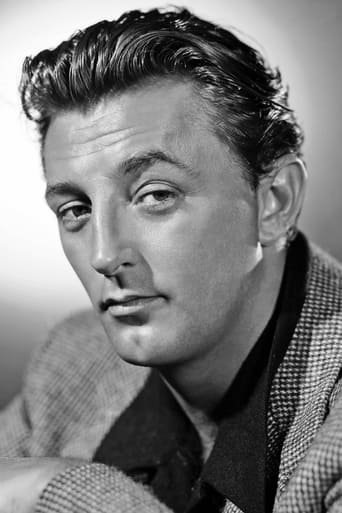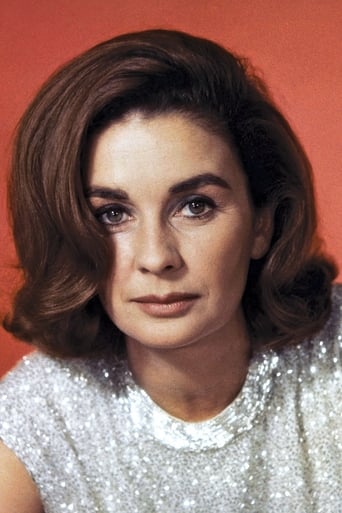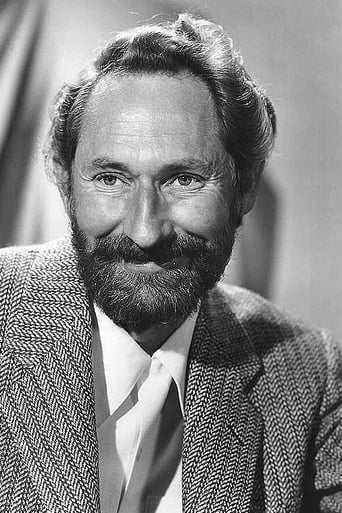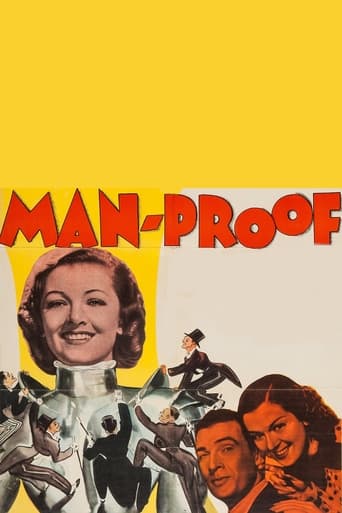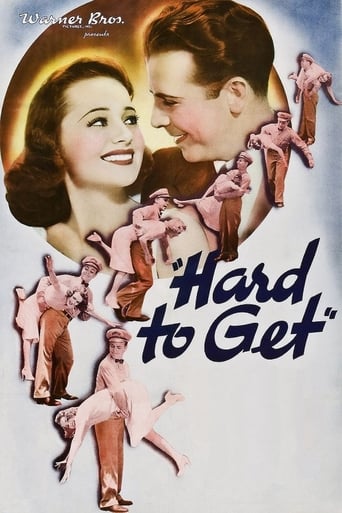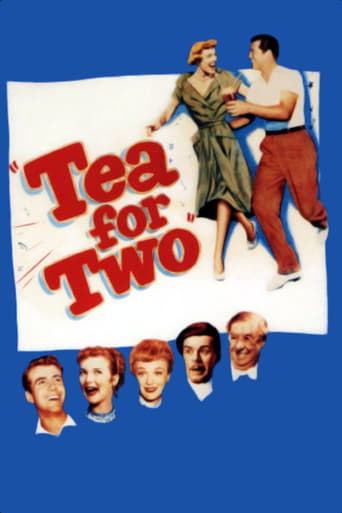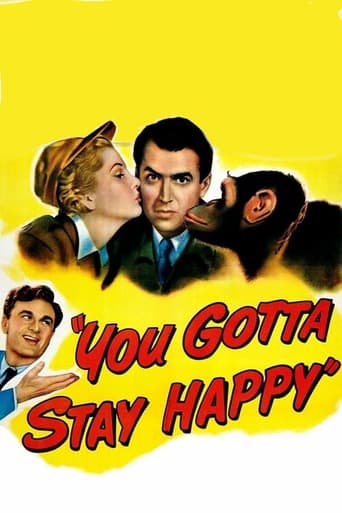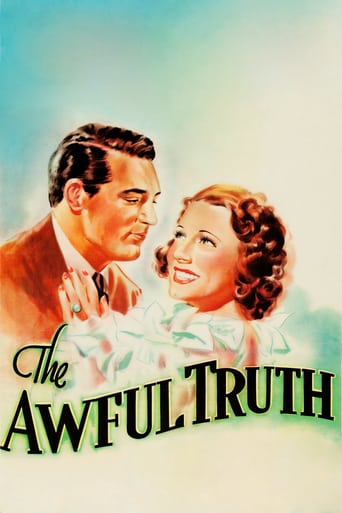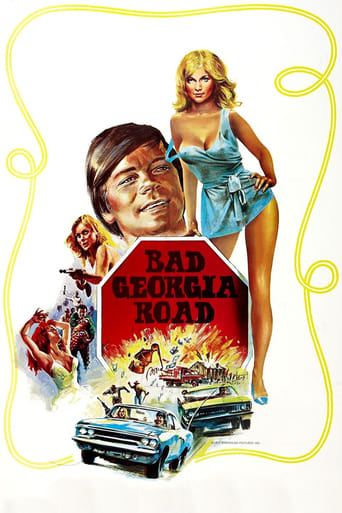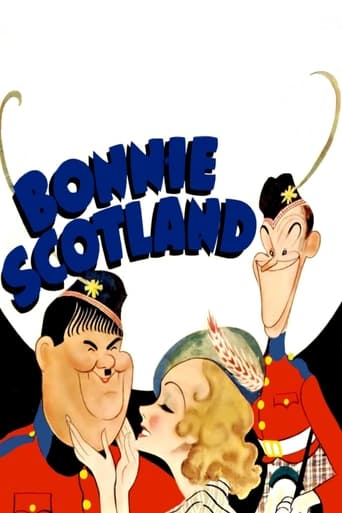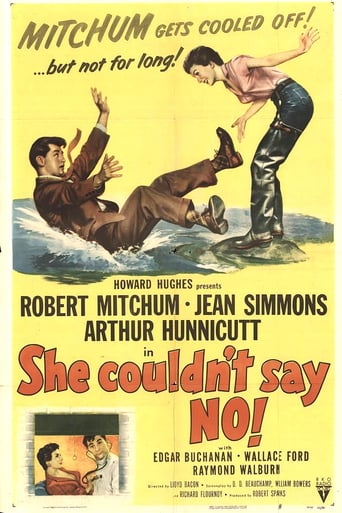
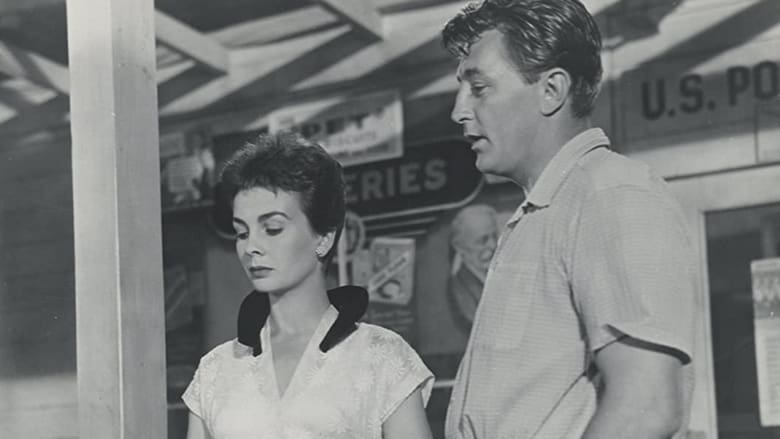
She Couldn't Say No (1954)
An heiress decides to pass out anonymous gifts in a small town.
Watch Trailer
Cast
Similar titles
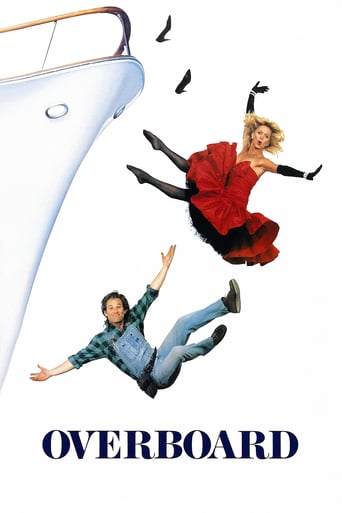
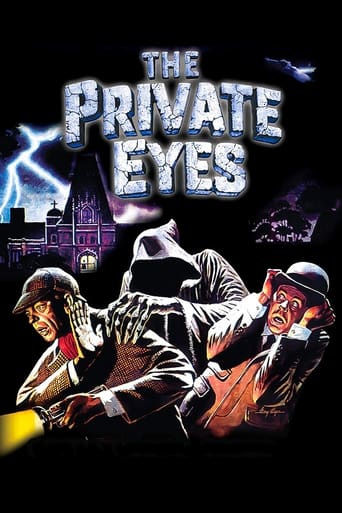
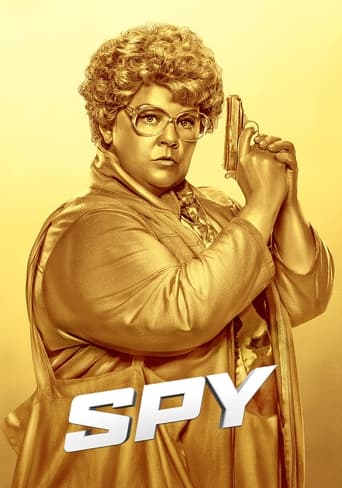
Reviews
Memorable, crazy movie
As Good As It Gets
A lot more amusing than I thought it would be.
This is a dark and sometimes deeply uncomfortable drama
SHE COULDN'T SAY NO is a fascinating entry in the canon of Robert Mitchum films; it is comedy set in a small Arkansas town in which he plays a doctor with a passion for fishing. Life proceeds in a calm unhurried manner until spoiled rich girl Korby Lane (Jean Simmons) pays an extended visit. With more money than sense, she makes every effort to make the citizens' life better by giving them presents and/or gifts of cash, as she believes she has a debt to reply to the town, for having saved her life when she was a little girl. Unfortunately she only succeeds in creating chaos. Lloyd Bacon's film (his final work in a long career) has a strong moral tone to it, suggesting quite overtly that money is the root of all evil. D. D. Beauchamp's and William Powers' screenplay has some sharp one-liners in it, allowing Mitchum to display his talent for throwaway observations (something equally evident in the interviews he gave over the years on television). The film also has some strong character-performances by Arthur Hunnicutt (as Odie, a recovering alcoholic with a penchant for non sequiturs such as "It's very Monday today, isn't it"); Wallace Ford (as a splenetic vet); and Hope Landin (as a maternal boarding-house keeper). Simmons' costumes are a continual source of attention, especially when compared with the rather dowdy attire of the citizens; it's clear she is trying her best to draw people's gazes towards her. In terms of ideology. SHE COULDN'T SAY NO is redolent of mid-Fifties attitudes towards women, suggesting that they are not "fulfilled" unless they get married and have children. Hence the ending is rather wearily predictable. But nonetheless there are some incidental pleasures along the way, not least the sequence where Mitchum brings boxes of diapers to one of his patients' houses, only to find that Korby has (anonymously) sent a huge pile already. The sight of Mitchum's face, a mixture of anger and sheer bewilderment, is a sight to behold, reminding us - if we didn't already know - of his versatility as a film actor, despite his public protestations to the contrary.
This movie could easily pass for "angel face" in reverse ,using the same actors,in the genre of comedy;one can only wonder what Frank Capra would have done with such a subject : a woman whose life was saved when she was a child and who wants to thank everybody (at the end everybody sings "Rudolph the red-nosed reindeer "says the news);without a great director the movie lacks tempo,madness ,all that made "it's a wonderful life" " Mr Smith goes to Washington" or "meet John Doe" masterpieces ."She couldn't say no " is a pleasant little comedy ,with two actors whose chemistry is obvious ,a nice village where you can have an ice cream whenever you want,the fishing parties ,Mitchum tells it so:when Simmons asks him why he did not leave for the broader horizons of a big city ,he did not need to answer .He has found his Shangri La ,his Brigadoon and the ending is revealing:all those people coming from every part of the country and only for the money is a danger for a peaceful community which does not seem to know greed,hunger or violence.
This whimsical movie is set in a fictitious town in Arkansas called Progress. Places such as Little Rock and Pine Bluff are mentioned. Then in one part one of the locals talks about the location being a few miles northwest of Little Rock which would place it somewhere around Mayflower or Conway, Arkansas. The countryside depicted in the movie looks a whole lot like southern California. Possibly one reason the name Progress was chosen was not only to cater to the stereotype at the time of Arkansas as a backward hillbilly state but also because the "Natural State's" slogan in those days was "Land of Opportunity." Being a native Arkansawer (Arkansan), I was pleased to see a fellow Arkansan, Arthur Hunnicutt, and someone from Missouri, Edgar Buchanan, in the cast. Hunnicutt is buried in Greenwood, Arkansas, near Fort Smith. He was a wonderful character actor and added authenticity to the film. "She Couldn't Say No" teamed Jean Simmons and Robert Mitchum once more and the pairing works fairly well, not as good as Robert Mitchum and Jane Greer but better than some of the other female partners assigned him over the years. Both Simmons and Mitchum were top of the line Thespians and much under appreciated, even today. The title is weak and keeps many from watching a somewhat clever and entertaining flick.I agree with one of the IMDb reviewers that not enough time is spent by director Lloyd Bacon developing the theme of media sensationalism once the press gets word that an anonymous donor has given the 200 residents of Progress money (the exact amount is not revealed but it was obviously a large sum). There's an old W.C. Fields movie "If I Had A Million" and an early TV series "The Millionaire" that dealt with how a million dollars given to strangers would change their lives and rather than making their dreams come true would usually alter their dreams in negative ways. So there was much potential in the basic theme of "She Couldn't Say No" that was never realized. The idyllic sporting life lived by the country doctor is exploited in interesting ways, especially when trying to hook the big fish in the creek. It blends well with the romantic attachment between the country physician, Dr. Robert Sellers (Mitchum), and the high society lady with a British accent,Corby Lane (Simmons). The repartee between the two is at times humorous, especially in the beginning when Dr. Sellers thinks she's a crazy patient who may have escaped from a mental ward. Digger, a forerunner of Opie, adds a little depth to Dr. Sellers' character and tends to be an asset. All in all this Howard Hughes throwaway is a good one to catch.
Jean Simmons goes to Progress, Arkansas where she rock and rolls all night and parties every day. Oops! wrong Jean Simmons. Actually Jean does do a little partying in Progress upon her arrival. Progress, Arkansas is a sleepy small town of 200 people and almost all of them character actors. Jean plays a spirited young rich woman who wants to give the citizens gifts and money because they saved her life when she was a child. Her gifts and money cause turmoil in the town. Mitchum plays the level headed town doctor. This may be the only film in his long career where he had to run a fair distance while wearing fishing waders. Come to think of it, Mitchum never really ran much in his films. He maybe did a short dashes in the many war pictures he made, but he never had to do a sustained run. Now Dustin Hoffman, there's an actor who ran a lot in his films. He ran in "The Graduate" and in "Marathon Man." I think he may have even ran a bit in "Tootsie." Anyway, I really liked the premise of "She Couldn't Say No" but I wish the film would have explored the disintegration of the town a little more after their economic windfall. It seemed like the troubles that Simmon's character wrought were resolved too easily as well. I still found the movie to be fairly amusing and entertaining.
